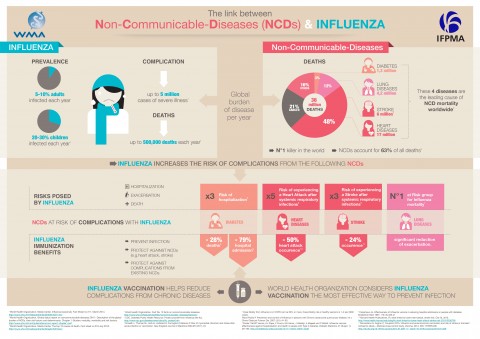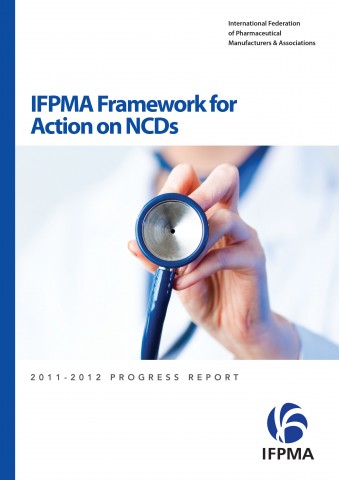IFPMA Statement under WHA 66 agenda item 13.2 on Draft action plan for the prevention and control of noncommunicable diseases 2013–2020
Delivered by Mr Mario Ottiglio, Director, Public Affairs and Global Health Policy
Thank you on behalf of the International Federation of Pharmaceutical Manufacturers and Associations (IFPMA), for the opportunity to provide our perspective on this cardinal public health issue -. IFPMA represents the global R&D pharmaceutical industry, whose primary contribution to global health is the development of innovative medicines and vaccines.
IFPMA welcomes WHO’s stewardship in addressing Non Communicable Diseases (NCDs). The Global Action Plan is a focused and pragmatic document which recognizes the size of the challenge, identifies the walls across sectors that must be torn down, and proposes tangible approaches to have clear results.
To have a significant impact, multi-stakeholder strategies are required at the global, regional and national levels. These need to be fully integrated into healthcare systems and extend beyond the traditional health sector. The R&D-based pharmaceutical industry is a part of the solution to addressing NCDs. The research-based pharmaceutical industry has made tremendous contributions to human health by researching and developing successive generations of new medicines to safely and effectively treat NCDs. There are currently over 4000 new medicines in the pipeline to treat cancer, diabetes, heart disease, asthma and mental disorders; but further innovation will certainly be needed.
We are eager to work with others in a process in which each actor can contribute its specific expertise. We believe that all competing interests can be managed through a declaration of interests and making appropriate safeguards available. As such, we are ready to take part in discussions leading to the creation of a Global Coordination Mechanism.
Besides investing in research and development of new medicines, our industry is also actively involved in ensuring that medicines for NCDs, as well as infectious diseases, are appropriate for, and made available in, resource-poor settings. IFPMA Members are also involved in many partnerships addressing prevention and control of NCDs. This is what makes non-communicable diseases particularly challenging: they require preventive practices among populations, which necessarily call for cooperation with different government and society sectors. IFPMA has recently entered into a landmark partnership with the International Federation of the Red Cross and Red Crescent societies. Leveraging the know-how of both organizations, we are developing a behavior change toolkit to empower populations to reduce their risk factors for developing NCDs. Upon implementation, this toolkit—distributed via IFRC’s volunteer network across five continents—is estimated to reach 3 million people.
As strong believers in the importance of prevention, our Members have implemented workplace wellness programs that benefit over one million of employees worldwide.
We look forward to sharing our experience as a leader in innovation and delivery of medicines and to listening to the voice of other stakeholders to identify efficient, effective, and sustainable solutions to improve the health of patients today, and nurture further innovation to meet the needs of tomorrow.
Thank you













